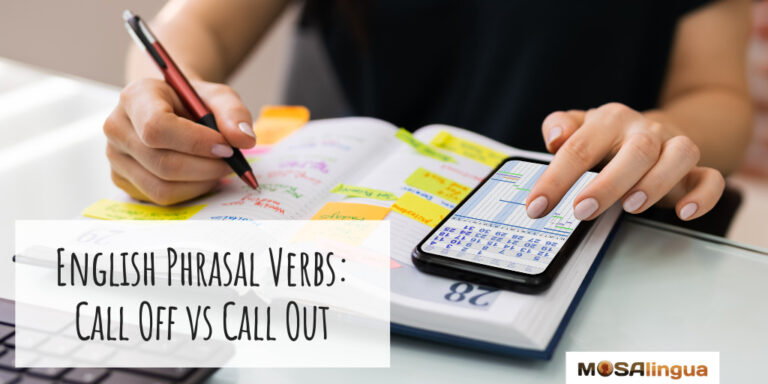We’re back again with another installment in our English phrasal verbs series. We’re using popular American TV shows to help you learn and memorize new vocabulary. It’s both effective and entertaining (which is just as important)! In this short lesson, learn about phrasal verbs with “call” and how to use them. Our English instructor Lizzie Jane has put together a video to help you remember the meaning of “call off” and “call out.” Grab some popcorn and let’s get started! 🍿

English Phrasal Verbs with “Call”
In this lesson, we’ll teach you some of the phrasal verbs that use the root verb “to call”:
- to call away
- to call back
- to call for
- to call in
- to call off
- to call on
- to call out
- to call up
If you’ve watched the rest of our English phrasal verbs series, you should already know what a phrasal verb is.
What is a phrasal verb?
But if this is your first time, welcome! (Or if you need a little review, that’s okay too!) We’ll start with a quick definition: a phrasal verb is an expression that’s made up of a verb paired with another word, usually a preposition, that changes its meaning. As a result, it becomes an idiomatic phrase.
Phrasal verbs are very common in English, and you’ll hear them in just about any conversation. They can also be a little easier to learn. Instead of needing to memorize a big list of words that are totally different from each other, you can build new expressions by adding together words you already know. And just like that, the phrase takes on a new meaning!
However, the fact that there can be several phrasal verbs with the same root can make it a little more difficult to keep them straight. But we can help with that—the MosaLingua app uses the spaced repetition system to help you learn new vocabulary quickly, and commit it to your long-term memory. All our instructors know the challenges that come with learning new vocabulary, so we have all kinds of advice for memorizing new information easily and effectively.
That being said, let’s dive into some practice! The activity below should be a helpful exercise.
Start off by learning about some of the different English phrasal verbs using “call” in the table below. We’ve included definitions and example sentences to help with context.
Once you’ve made it through the list, watch Lizzie’s video. For this activity, she picked a clip from Friends, one of our favorite shows for illustrating everyday English conversations.
| VERB | DEFINITION | EXAMPLE |
|---|---|---|
| to call | 1. to speak in a loud voice in order to be heard far away 2. to speak to or attempt to reach someone by phone | 1. He called to his friends when he broke his leg. 2. I am going to call my boss to see what she thinks. |
| to call away | to ask someone to leave a place in order to be somewhere else | The doctor was called away for an emergency. |
| to call back | to return a phone call | 1. I will call [you] back after I check my calendar. 2. Please call back later, I'm very busy right now. |
| to call for | to require; to make a request or a demand | 1. The recipe calls for two eggs. 2. After several complaints, the committee called for an investigation. |
| to call in | 1. to ask someone to do something 2. to notify someone that you will not be able to go somewhere (most often, to notify your employer that you will not be able to come to work) | 1. He called in a favor with his old friend. 2. She called in sick when she had the flu. |
| to call off | to cancel an event | We have to call off the meeting, because the presenter is sick. |
| to call on | 1. to request or invite 2. to select a person from a group to do something | 1. The judge called on the witness to tell his story. 2. The teacher always calls on the same students to answer questions. |
| to call out | 1. to shout something 2. to draw attention to a problem | 1. I called out your name three times and you didn't answer! 2. It is important to call out injustice wherever you see it. |
| to call up | 1. to call someone on the phone 2. to summon for military service | 1. I'll call up my dad and see what he suggests. 2. Many young men were called up for service during the Vietnam War. |
Watch: Pick the Correct Phrasal Verb with “Call” – Call Off VS Call Out
Our instructor Lizzie created a short video activity to introduce these phrasal verbs in context. She’ll teach you the phrasal verbs “call off” and “call out” and their meaning. Afterward, she’ll quiz you on what you remember! You can watch it right here or on our YouTube channel. The video is in English, but you can watch with English, Spanish, French, German, Italian, or Portuguese subtitles. Click the “Settings” gear at the bottom right to activate subtitles or change the playback speed.
Subscribe to our YouTube channel for more videos on vocabulary and
language learning tips
Phrasal Verbs Activity
If you can’t watch the video right now, you can still do Lizzie’s exercise!
First, read the transcript from the scene below. After that, fill in the blank with the correct phrasal verb. Take your best guess, then highlight the black lines below with your cursor to reveal the answer! Good luck! (And don’t forget to bookmark this article or share it on your social media so you can come back and watch the video later!)
Context: In this clip, Ross’s ex-wife Carol announces that she’s afraid there’s a problem with her wedding plans.
Transcript:
Ross: “What’s the matter?”
Carol: “Nothing.”
– “Okay, everything…”
– “I think we’re calling ____ the wedding.”
Monica: “You’re still going to pay me, right?”
Hint: Did you get it? If not, here’s a hint: The word in the blank is either (TO) CALL OFF or (TO) CALL OUT. If you need to refresh your memory of the meaning of “call off” and “call out,” don’t hesitate to scroll back up to the table and check the definitions you learned earlier.
Answer
CALL OFF; Carol is afraid that they’re going to call off her wedding. Remember, the expression “to call off” means to cancel an event.
*If you are reading this on a mobile phone, or if highlighting the text doesn’t show the answer, scroll down to the bottom of the article and flip your device upside down to see if you guessed correctly!
Next Steps…
I hope you found this article fun and useful! Don’t forget to subscribe to our YouTube channel and turn on your notifications so you don’t miss our next phrasal verbs video! Here are a few other articles you might find useful:
- English Phrasal Verbs with Hang | Hang Out VS Hang Up [VIDEO]
- English Phrasal Verbs with Go | Go Out VS Over [VIDEO]
- How To Make Learning English Easy and Fun
- Make or Do | English Grammar Hacks
·ʇuǝʌǝ uɐ ʅǝɔuɐɔ oʇ suɐǝɯ ˌˌɟɟo ʅʅɐɔ oʇˌˌ uoᴉssǝɹdxǝ ǝɥʇ ʻɹǝqɯǝɯǝꓤ ·ɓuᴉppǝʍ ɹǝɥ ɟɟo ʅʅɐɔ oʇ ɓuᴉoɓ ǝɹˌʎǝɥʇ ʇɐɥʇ pᴉɐɹɟɐ sᴉ ʅoɹɐꓛ ;ꓞꓞO ꓶꓶⱯꓛ




Comments